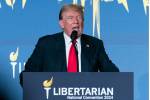About our horribly biased, unabashed, liberal editorials
"There is one good thing about Marx: he was not a Keynesian."
-- Murray Rothbard
Because we continue to get letters to the editor that begin with "Your editorials are biased ..." maybe we need to again explain the role of the editorial page, how it differs from the news pages and where we are coming from in our "biased" editorials.
Our unsigned editorials express the views of the newspaper as an entity and not that of an individual writer, just as the fine print at the bottom of the column states, but apparently few deign to read. For factual material about the events and issues of the day, those editorials often draw from the news stories in the newspaper.
Day to day I, as the editor, am the only one directly supervising both editorial and news writers. We assiduously strive to maintain an independence between the two such that the our opinions on the editorial page do not sway, spin or shape coverage in our news pages.
We try to keep our editorials consistent with certain philosophical principles -- and those are unabashed, unrepentant, unrelenting liberalism.
Yes, liberalism, but in the original and classic meaning of the word before it was confiscated and mongrelized by statists and progressives.
Classic liberalism, or libertarianism, as it has come to be labeled these days, advances the notion that everyone is best served by the autonomy of the individual, a government beholden to the consent of the governed, freedom from arbitrary and capricious authority and the right and wisdom of men and women to engage in free-market commerce to acquire and retain property for themselves and their heirs.
Much of that would fall under the rubric of conservatism, but that implies both a clinging to the past and a tendency to dictate to others certain moral and social behaviors.
No matter race, gender, creed or proclivity, every person is a minority of one and equal in rights, if not ability, to every other.
Our editorials have not opposed gay marriage, for example, but question what role the state should play in determining what a marriage is in the first place. We question the role of the state in telling people whether they may gamble, use drugs or pay for sex.
Some of the writers who laid the foundation for this way of thinking were:
-- John Locke, who gave us the concept of a right to life, liberty and property, which was lifted for the 14th Amendment, which says the people may not be deprived of these without due process of law.
-- Thomas Jefferson, whose Declaration of Independence edited Locke to read life, liberty and pursuit of happiness.
-- John Stuart Mill, whose "On Liberty" railed against government suppression of ideas.
-- Adam Smith, whose "invisible hand" economic theory concludes individuals acting in their own best interests in concert with like individuals produce a superior outcome to heavy-handed government interference.
Among modern columnists who share a libertarian leaning, if not a full embrace, are the likes of Thomas Sowell, John Stossel, Walter E. Williams and David Boaz.
Boaz describes the libertarian view as generally opposing government censorship, the draft, price controls, confiscation of property and regulation of our personal and economic lives.
Among economists of like minds you'll find F.A. Hayek, Milton Friedman, Ludwig von Mises and two former UNLV professors, Hans-Hermann Hoppe and Murray Rothbard.
Rothbard wrote in 1980, "Libertarianism does not offer a way of life; it offers liberty, so that each person is free to adopt and act upon his own values and moral principles. Libertarians agree with Lord Acton that 'liberty is the highest political end' -- not necessarily the highest end on everyone's personal scale of values."
Libertarianism would not dictate which bank or auto company to save with other people's money. It would not tolerate forcing people to buy insurance. It opposes forcing an oil company to create a slush fund without due process. It abhors limiting speech during a political campaign. It loathes a tyranny of the majority.
The bottom line might well be summed up by saying the state should exist to further the rights and liberties of the individual, rather than the individual existing to further the interests of the collective. People are not drones.
That is our editorial page bias.
Thomas Mitchell is editor of the Review-Journal and writes about the role of the press and the right to access public information. He may be contacted at (702) 383-0261 or via e-mail at tmitchell@reviewjournal.com. Read his blog at lvrj.com/blogs/mitchell.























